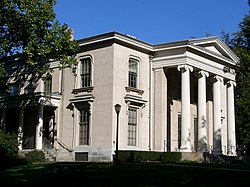Hillhouse Avenue Historic District
|
Hillhouse Avenue Historic District
|
|

Skinner House, Town and Davis, 1832.
|
|
| Location | Bounded by Sachem, Temple, Trumbull, and Prospect Sts., Whitney and Hillhouse Aves. & RR tracks, New Haven, Connecticut |
|---|---|
| Coordinates | 41°18′52.2″N 72°55′23.6″W / 41.314500°N 72.923222°WCoordinates: 41°18′52.2″N 72°55′23.6″W / 41.314500°N 72.923222°W |
| Area | 18 acres (7.3 ha) |
| Built | 1792 |
| Architect | Town and Davis, Henry Austin, et al. |
| Architectural style | Victorian |
| NRHP Reference # | 85002507 |
| Added to NRHP | September 13, 1985 |
Hillhouse Avenue is a street in New Haven, Connecticut, famous for its many nineteenth century mansions, including the president's house at Yale University. Both Charles Dickens and Mark Twain have described it as "the most beautiful street in America." Much of the avenue is included in the Hillhouse Avenue Historic District, which extends to include houses on adjacent streets.
The avenue is named for James Hillhouse (1743–1832) (and his son James Abraham Hillhouse, 1789–1841), innovator in land use in New Haven, who began the program of tree planting that gave New Haven its nickname, The Elm City, and who laid out the Trumbull Plan for Yale College and the Grove Street Cemetery.
Hillhouse Avenue was initially called Temple Avenue, and was staked out, 150 feet (46 m) wide, by Hillhouse employee, and later Yale president, Jeremiah Day, in 1792. The avenue ran from the Green at Temple Street to a hilltop location where James Abraham Hillhouse built the family mansion, Highwood (later called Sachem's Wood), in 1828. The houses along the wide avenue were set back with room for trees creating a park-like effect. The elms which once shaded the street were lost to Dutch Elm disease, but mature oak trees have largely taken their place.
The avenue was privately owned until 1862. Because of the nature of the street, its lots, and its orientation to the nine-square-grid of New Haven (the nation's first planned city), Hillhouse Avenue is sometimes considered to be the first suburb in the United States.
The Hillhouse mansion was razed in 1942 in accordance with a directive in the will of James Abraham Hillhouse's daughter, Isaphene. In time, Hillhouse Avenue came to be divided into an upper, residential area, and a lower portion for public buildings and the Farmington Canal. It is now just two blocks long, running from Grove to Sachem. The upper portion of the avenue, along with the adjacent blocks (and the Dana House), was designated the Hillhouse Avenue Historic District on the National Register of Historic Places in 1985.
...
Wikipedia


